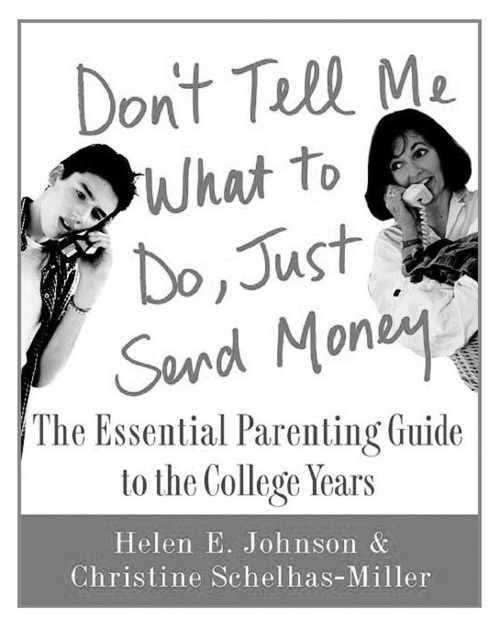It hadn’t occurred to me that my husband and I might skip the college family weekend this fall, when our older son becomes a freshman. But the authors of “Don’t Tell Me What to Do, Just Send Money” have given me pause.
Parents and their college-age sons and daughters are tied by an electronic umbilical cord. That’s the good news ― and the bad news. It takes some effort on everyone’s part if a family decides that frequent contact ― by phone, text, email, Skype or Facebook ― is not always healthy for relationships.
So what’s your average hovering baby boomer parent to do? This is probably not welcome advice, but it’s repeated and repeated throughout a new edition of “Don’t Tell Me What to Do, Just Send Money: The Essential Parenting Guide to the College Years” (St. Martin’s Press, July 2011). Step back, the authors say. Give up some control. Think about the situation from the student’s point of view.
 |
“Don’t Tell Me What to Do, Just Send Money” by Helen E. J o h n s o n a n d Ch r i s t i n eSchelhas-Miller. (MCT) |
Coauthor Helen E. Johnson suggests that parents begin detaching from their teenagers in the sophomore year. That’s high school, not college.
Students should take the lead in the college application process, she says, acknowledging that parents easily can be “sucked into maelstrom” of competition for the best colleges.
It’s no surprise that Johnson and co-author Christine Schelhas-Miller are mothers as well as professional experts in this transition from child to adult. Johnson founded Cornell University’s first parents’ program, and Schelhas-Miller teaches about adolescence and emerging adulthood there.
So you can believe their descriptions of the summer countdown to college. Parents feel stress about packing and planning; teenagers don’t.
The authors break down common moments, with sample conversations followed by what the parent and child each might be thinking and how to approach the tussle so that both sides come out ahead ― or at least not tearing their hair out.
“The summer before they go can be one of the toughest times, I think,” Schelhas-Miller said in a telephone interview. “They want to be autonomous. They’re anticipating the separation. Often they’re not getting organized, but you would like them to get organized. Kids start pushing their parents away before they go.”
The issues don’t disappear after that final dorm-room hug ― and the gargantuan effort not to cry in front of the new roommate.
The fact that so many students and parents are in touch every day can make things worse.
Parents can know too much about late nights, carousing roommates, bad quiz grades or just plain loneliness.
Johnson calls it the stress dump: “Everything is awful, I’m behind in all my work, I’m not getting any sleep, I just got a terrible grade on my paper.”
She received just such a call from a crying daughter, she said. And when she hung up, she asked her husband what they could do. He reminded her: “Isn’t this the stress dump? I don’t think you’re supposed to do anything.”
That, she said in an interview, was her “aha!” moment, and it reflected a universal wish of parents: They don’t want their children to be in such pain.
But Johnson suggested another way to handle the moment. “The best thing you can do is listen and maybe encourage them to get help on campus, like, Go talk to your professor,’” she said. “Try to look at yourself honestly. What are you getting out of being needed so much?”
The authors also suggest planning to talk once or twice a week. “That means it’s intentional, not just this constant stream of contact with a child who shares they got sprinkles on their ice cream cone,” Johnson said.
And about that parents’ weekend?
We haven’t decided yet, but I vow to listen to this advice: “If they don’t have a lot of time, you may decide to go, but you can say, ‘I know you have to go to the library. I am happy to go to a museum,’” Schelhas-Miller said. “Going doesn’t mean you have to spend 24 hours together.”
By Mary MacVean, Los Angeles Times
(McClatchy-Tribune Information Services)








![[Today’s K-pop] Blackpink’s Jennie, Lisa invited to Coachella as solo acts](http://res.heraldm.com/phpwas/restmb_idxmake.php?idx=644&simg=/content/image/2024/11/21/20241121050099_0.jpg)